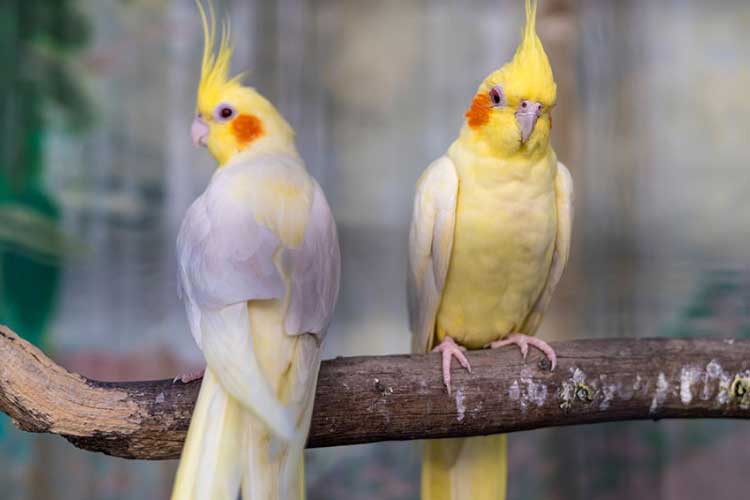If you keep pet cockatiels, you probably already know that these birds need fresh fruits in their daily diet. But are you aware that certain fruit seeds and pits are toxic if consumed in large amounts? Now you might be wondering, what about blueberries?
Can cockatiels eat blueberries? Yes, cockatiels can eat the berries in dried, frozen, or fresh forms. The berries are supplied with many essential vitamins that cockatiels need as part of their balanced diet. Besides, the fruits have low caloric content, making them a healthier option than other fruits.
But are these types of blueberries a healthy diet addition for your cockatiels, and can baby cockatiels also eat them? Below is a detailed insight into feeding blueberries to pet cockatiels.
Can You Feed Blueberries to Cockatiels?
Absolutely yes, but only as an occasional treat. The berries plus the seeds are one of the healthiest fruits you can feed your cockatiels either fresh or frozen. Not only are they rich in many essential nutrients, but also contain zero sodium and cholesterol levels. Some of these nutrients include:
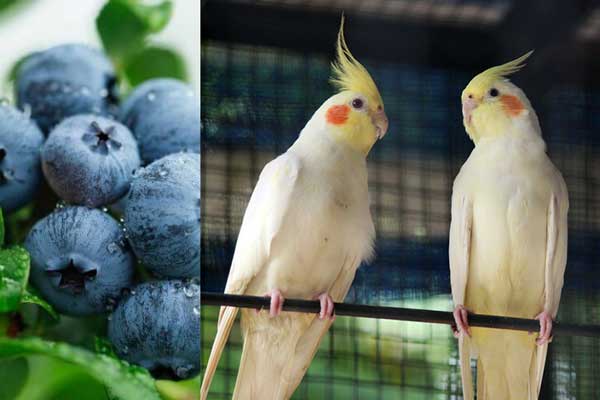
- Vitamin K
- Dietary fiber
- Vitamin C
- Potassium
- Manganese
- Vitamin A
- Calcium
- Protein
Even better, each cup of blueberries contains only 80 calories and virtually no fat content. Here is a table showcasing exactly how many nutrients a 140 g container of blueberries offers per serving.
| Fresh Blueberries serving size (140g) | Amount per serving |
| Calories | 80 g |
| Dietary fiber | 3 g |
| Protein | 1 g |
| Potassium | 108 mg |
| Vitamin C | 14 mg |
| Calcium | 8 mg |
| Vitamin A | 4 mcg |
| Sodium | 0 mg |
You see, a cockatiel’s balanced diet should comprise at least 25% seeds, 75% pellets, and fresh vegetables and a variety of fruits. Therefore, it makes sense to feed blueberries to these birds from time to time. And you don’t have to remove the fruit seeds because they are healthy and very tiny to cause choking.
Now, here comes the best part about cockatiels blueberries. Your birds can eat the berries dried, frozen, or fresh. However, while all the options make for a healthy snack, fresh blueberries are more nutrient-rich. The only advantage of dried berries is that they last longer.
As for frozen blueberries, they are an excellent snack if you live in exceedingly hot areas. Your healthy cockatiels can eat them as a cooling snack during those hot days.
But while your feathery friends can eat blueberries, you must be careful with how much they consume. Because you see, every cup of cockatiels blueberries contains at least 14g of sugar content. Therefore, feeding your cockatiel too much of these berries may lead to weight gain and other health issues.
Do Cockatiels Like Blueberries?
Yes. Pet and wild cockatiels all enjoy a diet with fruits, especially those with a sweet flavor. Ripe blueberries are very juicy and boast a sweet taste and fresh flavor that cockatiels like. And because these berries are not hard like some types of fruits, even young cockatiels in captivity can easily enjoy them.
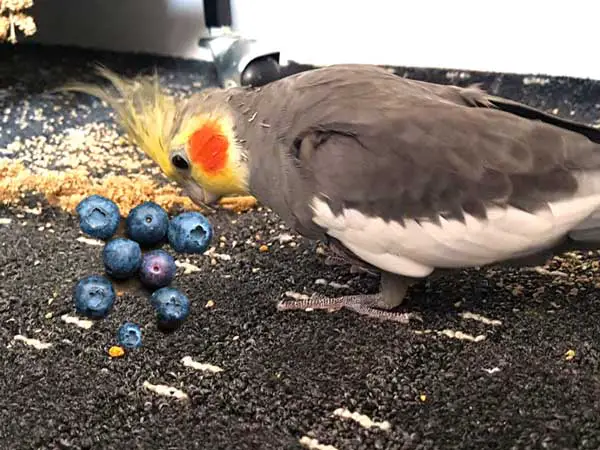
Health Benefits For Cockatiels Eating Blueberries
There are so many nutritional benefits for cockatiels eating blueberries similar to those of humans. It’s no wonder the berries are also referred to as a superfood. These benefits of blueberries include:
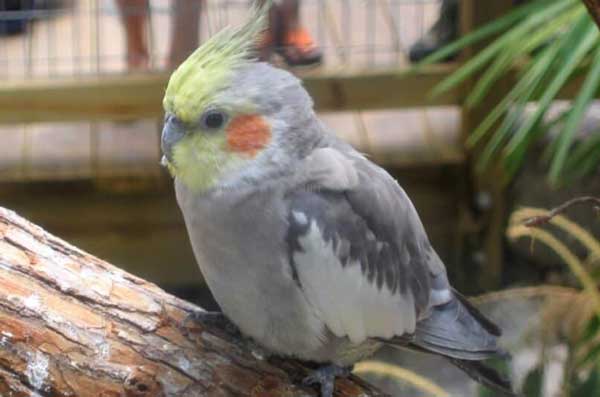
Source of antioxidants
These berries are also fully packed with antioxidants. Therefore, the fruits can help protect your feathered companions from damaging free radicals and the risk of many heart diseases.
Rich in anthocyanin compounds
Blueberries contain an abundance of anthocyanins. Feeding these berries to cockatiels can help reduce their risk of suffering from cardiovascular diseases. Besides, these compounds also have anti-obesity, anti-inflammatory, antimicrobial, and antidiabetic effects.
Helps with digestion
This superfood contains a significant amount of soluble fiber. So, feeding the berries to your cockatiels can help keep their gut healthy, normalize bowel movements, and prevent obesity.
Maintaining bone strength
Blueberry fruits also contain minerals such as manganese, calcium, phosphorus, zinc, and iron, but in small quantities. These minerals combined help build and maintain your cockatiel’s bone strength and keep the beak healthy.
Regulating blood sugar and pressure
Thanks to their high fiber and low sugar content, blueberries have not been shown to cause cockatiel’s blood sugar to spike. As such, the berries may aid in blood sugar and blood pressure management.
How Much Blueberries Should Cockatiels Eat?
Cockatiels should only eat blueberries as an occasional treat. According to bird experts, a few berries once per day for 2-3 times a week should be enough. This is because your bird’s varied diet should comprise between 20 to 25% of fruits and vegetables. So, cockatiels blueberries should only make up a small part of that.
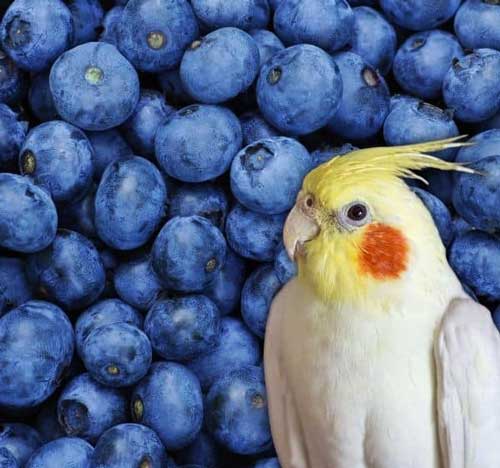
How Do You Prepare Blueberries for Cockatiels?
Like with other fruits, you start by washing the blueberries thoroughly to remove traces of chemicals. For the best results, you can soak the berries in a bowl of clean and cold water for a couple of minutes. Then, rinse them with a lot of fresh water.
Once they are clean, put the fruits in a bowl and give your pet birds to eat inside their cage. But for smaller birds, you can slice the berries in half before serving.
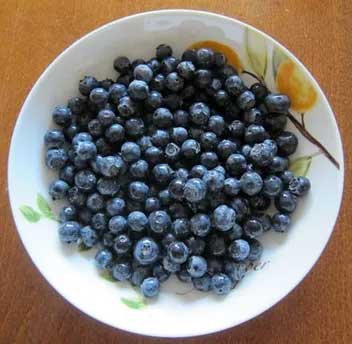
Additionally, you can use a juicer to prepare blueberry juice for your cockatiels at home. Then, you can feed the drink to the birds on its own or add it to their water bowl.
Can You Feed Blueberries to Baby Cockatiels? If so, how?
Yeah, blueberries are not harmful to baby cockatiels. However, since baby cockatiels lack strong beaks as their adult counterparts, you must mash the berries. You could also chop them into small pieces. Then, serve the berries to the birds in a bowl or simply hand-feed them from time to time.
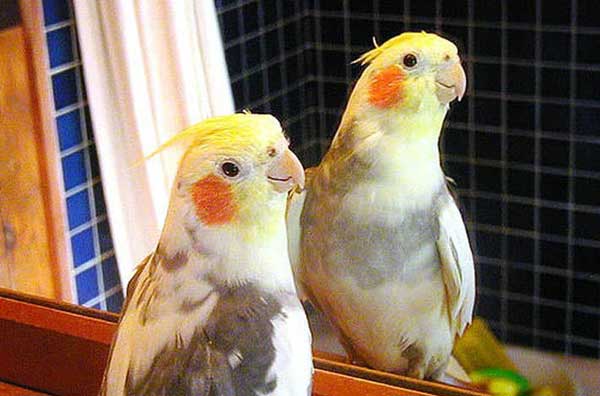
Which Is Better Between Fresh and Dried Blueberries for Cockatiels?
Both fresh and dried blueberries contain the same fiber content and antioxidant value. Even so, fresh berries are a healthier choice than their dried counterparts. This is because dried berries contain high sugar and caloric content, which may lead to weight gain for your birds. In addition, dried fruits have lesser amounts of vitamin C than their fresh counterparts.
FAQ
Sure, we might have discussed nearly everything you need to know about feeding blueberries to pet cockatiels. But let’s take a quick look at commonly asked questions.
Adult cockatiels may not choke on berries, but their baby counterparts can. Therefore, you should always chop the blueberries into small pieces before serving them to these birds.
It is completely normal for cockatiels poop to resemble the color of the food they have eaten. So, when these birds’ snack on blueberries, the droppings will change to a dark color.
Conclusion
Blueberries are perhaps among the most nutritious fruits available. For this reason, it is safe for cockatiels to eat the berries. Besides, there are many health benefits for your feathered friends eating these berries.
The best part is that even baby cockatiels can eat blueberries. All you’ve to do is cut the berries into smaller chunks or mash them to avoid choking. Now, if you have to choose between fresh and dried berries, fresh blueberries are more nutritious.
Do you know if your cockatiels can eat pistachios or pomegranate? Read our articles about it to learn more.
